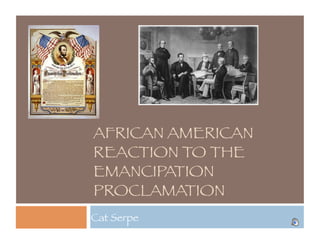
African American Reactions to the Emancipation Proclamation
- 1. AFRICAN AMERICAN REACTION TO THE EMANCIPATION PROCLAMATION Cat Serpe
- 2. Who: African Americans -notable African Americans – Frederick Douglass -free and enslaved What: Reactions to the issuance of the Emancipation Proclamation When: January 1, 1863 Where: North and South
- 3. Major Points How blacks were informed of the Proclamation Positive view of the issuance and of Lincoln -Celebrations in the North and the South Negative view Gratitude for progress
- 4. Informed Uninformed Order from Gen. Milroy -New York Henry Cheatam and Mary Informal slave grapevine Estes Peters James Simms -Mississippi and Arkansas -Georgia The Government Printing Slaveholders attempted to Office and Governor John hide the news Andrew created copies to distribute
- 5. Celebrations New York Religious services New Jersey Sermons Massachusetts General interchange of Illinois sentiments Washington DC Masses South Carolina Music Pennsylvania Supper Parades
- 6. Negative DOUGLASS' MONTHLY - March, 1863 REBEL VIEW OF THE PROCLAMATION “I have no purpose, directly or indirectly, to interfere with the institution of slavery in the States where it exists. “ Jerone Bennett Forced into Glory: Abraham Lincoln’s White Dream “…the gravest charge that one can place against him is that he betrayed the trust of four million slaves who, not having reliable information, believed Lincoln was their friend because their enemies said Lincoln was their enemy”
- 7. Frederick Douglass Admitted some disappointment in the Proclamation Tremont Temple hosted a meeting for many great black abolitionists “thanked God that he was alive to see the end of slavery.”
- 8. Gratitude for progress THE CHRISTIAN RECORDER - January 3, 1863 THE PRESIDENT'S PROCLAMATION DOUGLASS' MONTHLY - February, 1863 REJOICING OVER THE PROCLAMATION DOUGLASS' MONTHLY - February, 1863 THE RESULTS OF THE PROCLAMATION. THE CHRISTIAN RECORDER - January 30, 1864 EMANCIPATION CELEBRATION AT WILMINGTON
- 9. Discussion What were your initial thoughts on this topic? Were you surprised that slaves were celebrating, even though they were aware that they wouldn’t immediately be freed?
- 10. Picture references Sources: Primary: African American newspapers, slave narratives, poems Secondary: Allen Guelzo, Lerone Bennett, and Eric Foner http://www.loc.gov/rr/program/bib/ourdocs/ EmanProc.html http://memory.loc.gov/ammem/alhtml/almintr.html http://www.pbs.org/wgbh/aia/part4/4p1539.html